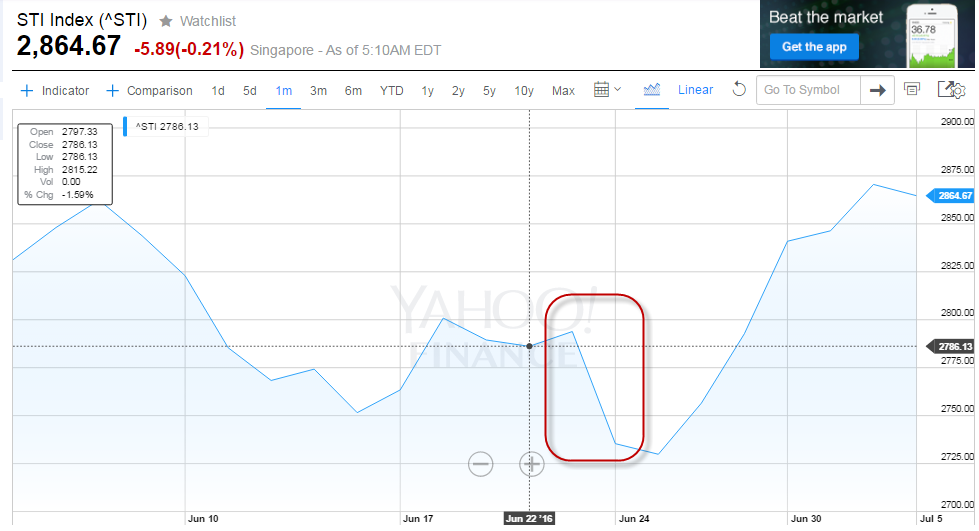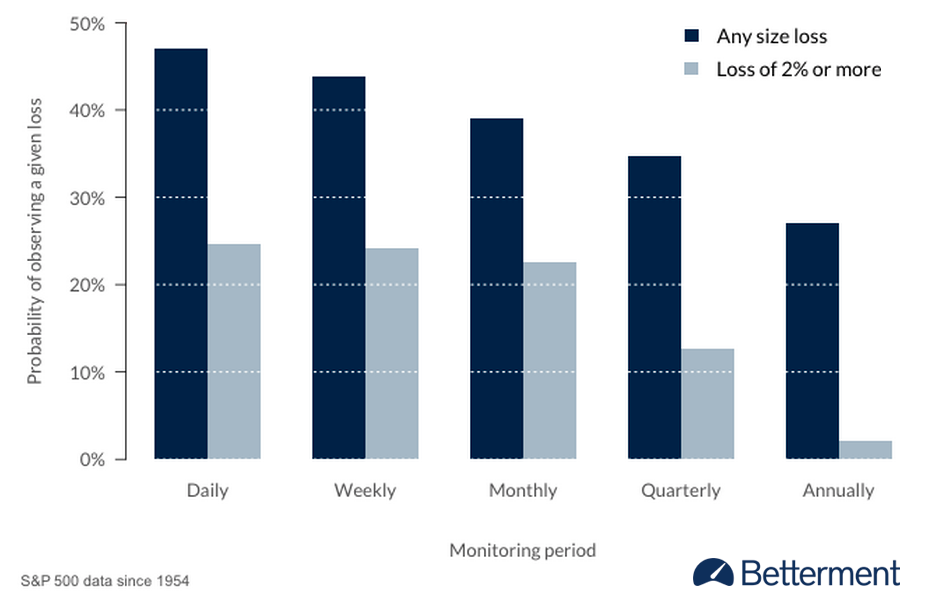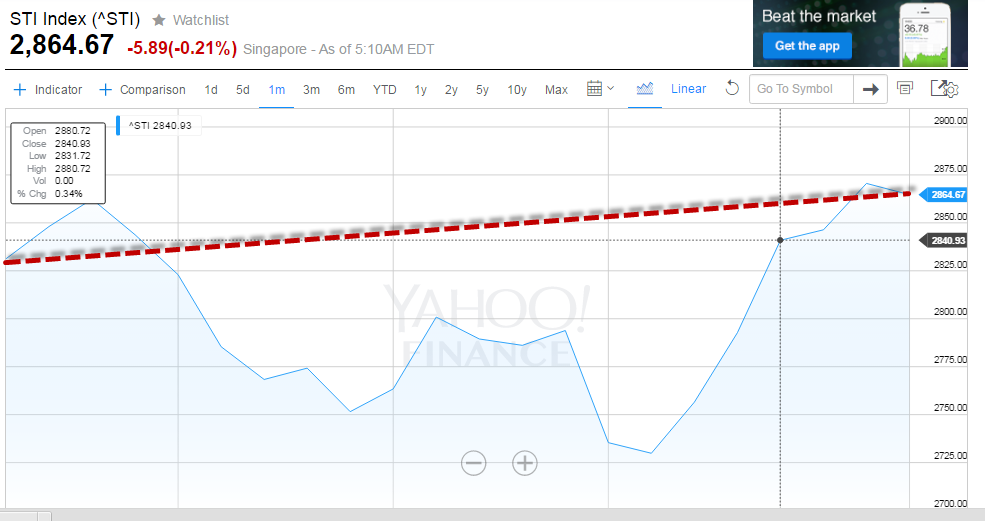One of my friends is American, but lives and works in the UK. Even though he couldn’t vote in the referendum, he fought really hard for the “Remain” campaign. In the days leading up to the vote, he even started handing out flyers.
Well, he was obviously disappointed.
Now that Brexit has happened, he’s not sure whether he should continue living in the UK. When I lamely suggested that he could always move back to the US, he said, “Well, not if Trump is going to be President!!”
I’ve deliberately held off from blogging about Brexit because:
- Too many people are talking about it; and
- Events like these make people do dumb things with their investments
Don’t get me wrong – Brexit IS a big deal. There’s tremendous uncertainty surrounding the future of the EU, the UK, and it shows how economic resentment can swing politics in irrational directions. (Are you listening, USA?)
However, it’s just not that a big of a deal for your investments.
What Did You Do When Brexit Happened?
The Brexit referendum was announced on June 23. In response, markets plummeted. The GBP crashed. Everyone ran around in circles, waved their hands in the air and screamed “AHHHHHHHHHHHHHH!!”
You can totally see the effects on financial markets around the world. For example, the Straits Times Index (STI) plunged lower than Sun Ho’s neckline in China Wine. Scaryyyy!
But amidst all the terror and confusion and scariness, what did YOU do?
Did you keep refreshing your phone to get real-time updates? Did you call your financial planner? Did you sell your investments?
Or in the weeks leading up to the referendum, were you worried? Did you move your money to safe assets like bonds? Did you make a big bet anticipating that the market would move one way or another?
How’d that work out for ya?
The Bliss Of Ignorance
When I first heard about Brexit, I was having a delicious lunch of salted egg chicken and rice. (Mmmmm). I saw the news on my phone, said “Woahhh!” to myself, and then then went back to eating. Because, you know, priorities.
I didn’t check my stocks on Yahoo Finance. I had no idea how my investments were doing. I simply carried on with life like a normal human being.
That’s the great thing about index investing: Your plan stays the same no matter what. Nothing – Brexit, Trump, an asteroid hitting Singapore – would change your investing strategy.
In fact, it’s probably the only strategy in the world that rewards you for knowing LESS instead of knowing more.
Research has shown that the more frequently you check your investments, the more likely you are to observe a loss. Check out this nifty chart from Betterment:
Take a look at the light blue bars – these represent the probability of observing a moderate loss (more than 2%) in your investments.
For example, checking your portfolio quarterly instead of daily reduces the chance of observing such losses from 25% to 12%. And if you only take a peak annually? You’ll almost never see a big loss!
Personally, I check my portfolio quarterly. The last time I peeked was in April 2016.
When I logged in again in July, I noticed that despite all the turmoil and everyone screaming AHHHHH about Brexit, my STI investments actually saw a small profit:
When you read the papers, it seems like there’s a crisis every day. Last year, it was fears about Greece defaulting and China being in a bubble. This year, it was about the Fed raising rates, Brexit, and StanChart in Holland Village getting robbed (haha).
But you know what? As investors, we’d be much better off if we just tune out.
How To Cultivate Blissful Ignorance
I get it – it’s easier said than done. When newspaper headlines are proclaiming doomsday and CNBC is showing nothing but big red down arrows, you can’t help but worry.
So here’s how to cut out the noise and become a better investor.
First, check your investments on a pre-determined schedule. For example, I log into my brokerage account just 4 times a year. Other people do it only once a year. Either way, it helps to keep you disciplined.
Next, make the news LESS available. Delete the stock alerts on your phone. Unsubscribe from CNBC. If you HAVE to read the news, go for a weekly periodical like the Economist. Trust me – 99.9% of financial “news” will have zero impact on your personal investments and life.
Third, purposely make it HARDER to invest. Technology these days is supposed to make it easier to trade, but I believe in doing the opposite. I don’t download any trading apps. I use an old-school token to authenticate my brokerage account… and then I leave the token in a locked drawer.
Together, these strategies ensure that I don’t do anything stupid when it comes to my investments.
When I first started, I had to rely on strategies like these to keep myself in check. Over time, it’s become easier not to care too much – which ironically, help to make me a more effective investor.
Let the gancheong spider investors worry and overtrade. We passive investors prefer focusing on our careers, spending time with our families, and doing the things we love.
Image credits: Roberto Trombetta, Betterment




This is a great post on how little impact Brexit has when you are doing index investing. Totally agree that the investing strategy doesn’t change regardless of external events and works better when you ignore the financial news headlines!
Thanks Lionel for this important reminder (could have come a bit earlier though, haha).
I believe the average person looks at the stock market or the news headlines and makes a huge error of omission.
We tend to forget that hundreds of thousands of people – and vastly more computers – are seeing exactly the same information.
This is the main reason why most of these prediction methods uttered by those “experts” in the media are useless. They are way too slow!
Most market pundits are only important to us in so much as they scare other people out of assets, and so give us more chances to buy cheap.
Looking at the recent Brexit-Dip all passive investors can once again proceed smug in the knowledge that their method of index tracking provides the best way of ignoring all this irrelevant noise.
Inaction may be the biggest form of action in volatile times.
A patient mind is the best remedy for trouble. – Plaut
Love this! Never thought about it that way, but I guess market pundits DO have a use for us – ie they help the market to panic so we can buy our investments cheaper
Hi Lionel!
In light of the article you penned, what do you think of algorithmic trading that is offered by IG (http://blog.moneysmart.sg/invest/think-investing-like-gambling-system-trading-might-change-game-investors-forever/)?
Is it similar to your method of investing? Does it make for a compelling case to use both your method and IG’s platform for investing?
Thanks!